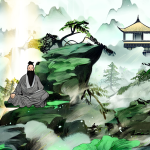《报任安书》原文

太史公牛马走司马迁再拜言。
少卿足下:曩者辱赐书,教以慎于接物,推贤进士为务。意气勤勤恳恳,若望仆不相师,而用流俗人之言。仆非敢如此也。请略陈固陋。阙然久不报,幸勿为过。
仆之先人非有剖符丹书之功,文史星历,近乎卜祝之间,固主上所戏弄,倡优所畜,流俗之所轻也。假令仆伏法受诛,若九牛亡一毛,与蝼蚁何以异?而世又不与能死节者比,特以为智穷罪极,不能自免,卒就死耳。何也?素所自树立使然也。人固有一死,或重于泰山,或轻于鸿毛,用之所趋异也。太上不辱先,其次不辱身,其次不辱理色,其次不辱辞令,其次诎体受辱,其次易服受辱,其次关木索、被箠楚受辱,其次剔毛发、婴金铁受辱,其次毁肌肤、断肢体受辱,最下腐刑极矣!传曰:“刑不上大夫。”此言士节不可不勉励也。猛虎在深山,百兽震恐,及在槛阱之中,摇尾而求食,积威约之渐也。故士有画地为牢,势不可入;削木为吏,议不可对,定计于鲜也。今交手足,受木索,暴肌肤,受榜箠,幽于圜墙之中。当此之时,见狱吏则头枪地,视徒隶则心惕息。何者?积威约之势也。及以至是,言不辱者,所谓强颜耳,曷足贵乎!
且西伯,伯也,拘于羑里;李斯,相也,具于五刑;淮阴,王也,受械于陈;彭越、张敖,南面称孤,系狱抵罪;绛侯诛诸吕,权倾五伯,囚于请室;魏其,大将也,衣赭衣,关三木;季布为朱家钳奴;灌夫受辱于居室。此人皆身至王侯将相,声闻邻国,及罪至罔加,不能引决自裁,在尘埃之中。古今一体,安在其不辱也?由此言之,勇怯,势也;强弱,形也。审矣,何足怪乎?夫人不能早自裁绳墨之外,以稍陵迟,至于鞭箠之间,乃欲引节,斯不亦远乎!古人所以重施刑于大夫者,殆为此也。
夫人情莫不贪生恶死,念父母,顾妻子;至激于义理者不然,乃有所不得已也。今仆不幸,早失父母,无兄弟之亲,独身孤立,少卿视仆于妻子何如哉?且勇者不必死节,怯夫慕义,何处不勉焉!仆虽怯懦,欲苟活,亦颇识去就之分矣,何至自沉溺缧绁之辱哉!且夫臧获婢妾,犹能引决,况仆之不得已乎?所以隐忍苟活,幽于粪土之中而不辞者,恨私心有所不尽,鄙陋没世,而文采不表于后世也。
古者富贵而名摩灭,不可胜记,唯倜傥非常之人称焉。盖文王拘而演《周易》;仲尼厄而作《春秋》;屈原放逐,乃赋《离骚》;左丘失明,厥有《国语》;孙子膑脚,《兵法》修列;不韦迁蜀,世传《吕览》;韩非囚秦,《说难》《孤愤》;《诗》三百篇,大底圣贤发愤之所为作也。此人皆意有所郁结,不得通其道,故述往事,思来者。乃如左丘无目,孙子断足,终不可用,退而论书策,以舒其愤,思垂空文以自见。
仆窃不逊,近自托于无能之辞,网罗天下放失旧闻,略考其行事,综其终始,稽其成败兴坏之纪,上计轩辕,下至于兹,为十表,本纪十二,书八章,世家三十,列传七十,凡百三十篇。亦欲以究天人之际,通古今之变,成一家之言。草创未就,会遭此祸,惜其不成,是以就极刑而无愠色。仆诚以著此书,藏之名山,传之其人,通邑大都,则仆偿前辱之责,虽万被戮,岂有悔哉!然此可为智者道,难为俗人言也。
且负下未易居,下流多谤议。仆以口语遇遭此祸,重为乡党所笑,以污辱先人,亦何面目复上父母之丘墓乎?虽累百世,垢弥甚耳!是以肠一日而九回,居则忽忽若有所亡,出则不知其所往。每念斯耻,汗未尝不发背沾衣也!身直为闺阁之臣,宁得自引深藏于岩穴邪?故且从俗浮沉,与时俯仰,以通其狂惑。今少卿乃教以推贤进士,无乃与仆私心剌谬乎?今虽欲自雕琢,曼辞以自饰,无益,于俗不信,适足取辱耳。要之死日,然后是非乃定。书不能悉意,略陈固陋。谨再拜。
中文翻译
太史公司马迁恭敬地向任安拜了两次并致意。
少卿足下:从前承蒙您给我写信,教导我要谨慎地待人接物,并以推荐贤能之士为己任。情意十分恳切诚挚,好像是抱怨我没有遵从您的教诲,而是追随了世俗之人的意见。我是不敢这样做的。请允许我大略地说说自己的鄙陋之见。隔了很久还没有给您回信,希望您不要责怪。
我的祖先没有剖符丹书的功劳,只是掌管文献、历史、天文和历法,类似于占卜和祭祀之官,本来就是供皇上戏弄的人,像乐师、优伶那样被豢养,而被世人所轻视。假使我伏法被杀,那就像九牛身上失去一根毛,同蝼蚁又有什么区别呢?而世俗又不把我和那些为坚持气节而死的人相提并论,只是认为我智虑穷尽,罪恶极大,不能自我解脱,终于走上死路罢了。为什么呢?这是因为我平素所从事的职业和所处的地位使人们有这样的看法。人本来总有一死,有的死比泰山还重,有的死比鸿毛还轻,这是因为他们追求的东西不同啊。最上一等是不辱没先人,其次是不辱没自身,其次是脸面上不受辱,其次是言辞上不受辱,其次是被捆绑在地受辱,其次是换上囚服受辱,其次是戴上木枷、遭受杖刑受辱,其次是剃光头发、颈戴铁圈受辱,其次是毁伤肌肤、断肢截体受辱,最下等的是腐刑,受辱到了极点!《礼记》上说:“对大夫不能用刑。”这是说士人不可不保持自己的操守。猛虎在深山里,百兽都震惊恐惧,可它一旦落入陷阱和栅栏之中,便摇头摆尾向人求食,这种屈服的威势是逐渐形成的。所以,有这样的士人,在地上画个圈作监牢他也决不进入;削根木头作法吏他也决不面对,而是在受辱之前就态度鲜明地决定自杀。现在我已成了一个囚徒,手铐脚镣加在身上,鞭子棍棒打在身上,被关在四面高墙的监狱之中。在这个时候,看见狱吏就叩头触地,看见狱卒就胆战心惊。这是为什么呢?这是由于威势的逼迫逐渐积累造成的。等到已经到了这一步,却说自己没有受辱,不过是厚着脸皮罢了,哪里值得尊重呢!
况且西伯(姬昌)是诸侯之长,却被囚禁在羑里;李斯是丞相,却遭受了五种刑罚;淮阴侯韩信是王,却在陈地被戴上刑具;彭越、张敖都是面向南方称孤道寡的王,却被捕入狱判了罪;绛侯周勃诛杀了吕氏家族,权势超过春秋五霸,却被囚禁在请罪室中;魏其侯窦婴是大将,却穿上了赭色的囚衣,戴上了木枷、脚镣和颈钳;季布自请做了朱家的奴仆;灌夫被拘禁在居室里受辱。这些人都身至王侯将相,声名传扬到邻国,等到犯了罪而法网加身的时候,不能引决自裁,在尘埃之中死去。古今都一样,哪里有不受屈辱的呢?由此说来,勇怯强弱都是形势所造成的。明白了这个道理,还有什么值得奇怪的呢?一个人不能早在法律制裁之前就自杀来逃避,因而渐渐志气衰微,等到挨打受刑的时候,才想到要为气节而死,这不也太晚了吗?古人之所以对大夫施刑很慎重,大概就是因为这个缘故。
人之常情没有不贪恋生存、厌恶死亡的,没有不顾念父母妻儿的。至于那些被义理所激发的人则不是这样,那是有不得已的地方。现在我不幸,早年失去了父母,又没有兄弟相亲,独自一人孤立于世,少卿您看我对妻儿又怎样呢?况且勇敢的人不必以死殉节,怯懦的人仰慕大义,又何处不可以勉励自己呢!我虽然怯懦,想苟全性命,但也颇能区分弃生就死的界限,怎么会自甘沉溺于牢狱的侮辱之中呢!况且奴婢婢妾还能自杀,何况我处于不得已的境地呢!我之所以要克制忍耐、苟且偷生,被囚禁在污秽的牢房里而不肯去死,是因为遗憾自己的心愿尚未实现,如果平平庸庸地死了,文章就不能在后世显露出来。
古时候虽富贵但名字磨灭不传的人,多得数不清,只有那些卓异而不平常的人才在世上著称。(那就是:)西伯姬昌被拘禁而扩写《周易》;孔子受困窘而作《春秋》;屈原被放逐,才写了《离骚》;左丘明失去视力,才有《国语》;孙膑被截去膝盖骨,《兵法》才撰写出来;吕不韦被贬谪蜀地,后世才流传着《吕氏春秋》;韩非被囚禁在秦国,写出《说难》《孤愤》;《诗》三百篇,大都是一些圣贤们抒发愤懑而写作的。这些都是人们感情有压抑郁结不解的地方,不能实现其理想,所以记述过去的事迹,让将来的人了解他的志向。就像左丘明没有了视力,孙膑断了双脚,终于不能被人重用,便退隐著书立说来抒发他们的怨愤,想到活下来从事著作来表现自己的思想。
我私下里也自不量力,近来用我那不高明的文辞,收集天下散失的历史传闻,粗略地考订其事实,综述其事实的本末,推究其成败盛衰的道理,上自黄帝,下至于当今,写成十篇表,十二篇本纪,八篇书,三十篇世家,七十篇列传,一共一百三十篇,也是想探求天道与人事之间的关系,贯通古往今来变化的脉络,成为一家之言。刚开始草创还没有完毕,恰恰遭遇到这场灾祸,我痛惜这部书不能完成,因此便接受了最残酷的刑罚而不敢有怒色。我现在真正的写完了这部书,打算把它藏进名山,传给可传的人,再让它流传进都市之中,那么,我便抵偿了以前所受的侮辱,即使受再多的侮辱,难道会后悔吗?然而,这些只能向有见识的人诉说,却很难向世俗之人讲清楚啊!
再说,背着侮辱而在世上生活是很不容易的,地位卑贱的人,往往被人诽谤和议论。我因为多嘴说了几句话而遭遇这场大祸,又被乡里之人、朋友羞辱和嘲笑,污辱了祖宗,又有什么面目再到父母的坟墓上去祭扫呢?即使是到百代之后,这污垢和耻辱会更加深重啊!因此我腹中肠子每日多次回转,坐在家中,精神恍恍惚惚,好像丢失了什么;出门则不知道往哪儿走。每当想到这件耻辱的事,冷汗没有不从脊背上冒出来而沾湿衣襟的。我已经成了宦官,怎么能够自己引退,深深地在山林岩穴隐居呢?所以只得随俗浮沉,跟着形势上下,以表现我狂放和迷惑不明。如今少卿竟教导我要推贤进士,这难道不是与我自己的愿望相违背的吗?现在我虽然想自我雕饰一番,用美好的言辞来为自己开脱,这也没有好处,因为世俗之人是不会相信的,只会使我自讨侮辱罢了。简单地说,人要到死后的日子,然后是非才能够论定。书信是不能完全表达心意的,只是略为陈述我愚执浅陋的意见罢了。谨再次拜谢。
英文翻译
Sima Qian, a humble servant of the Grand Historian, bows twice and speaks.
My dear Shaoqing: Previously, I received your letter, in which you admonished me to be cautious in dealing with people and to take it as my duty to recommend the worthy and promote the talented. Your words were so earnest and sincere that it seemed you were blaming me for not following your advice but instead going along with the common views. I dare not do such a thing. Please allow me to briefly state my humble opinions. It has been a long time since I replied to your letter, and I hope you will not take it amiss.
My ancestors did not have the merits of being granted a fief with a tally and a written decree. They were merely in charge of historical records, astronomy, and the calendar, somewhat similar to diviners and ritual officials. They were originally just playthings for the emperor, like singers and dancers kept for amusement, and were despised by the common people. If I were to be executed according to the law, it would be like losing one hair from nine oxen, no different from an ant. And the world does not compare me with those who died for their integrity. Instead, they simply think that I was out of ideas and my crimes were so serious that I could not extricate myself and finally met my death. Why is that? It is because of the position I held and the work I did. People are bound to die, some dying more weighty than Mount Tai, and some lighter than a feather. This is because what they pursue is different. The highest level is not to disgrace one's ancestors; the next is not to disgrace oneself; the next is not to let one's face be humiliated; the next is not to let one's words be insulted; the next is to be bound and humiliated; the next is to change clothes and be humiliated; the next is to be shackled and flogged; the next is to have one's hair shaved off and wear an iron collar; the next is to have one's flesh cut and limbs broken; and the most extreme is castration! It is said in The Book of Rites, "Do not execute a gentleman." This means that a gentleman should not be deprived of his integrity. When a fierce tiger is in the deep mountains, all the beasts are terrified. But once it falls into a trap or an enclosure, it wags its tail and begs for food. This gradual process of subjugation is due to the constant pressure of power. So, when it comes to this point, to say that one is not humiliated is just to put on a bold face, which is hardly worthy of respect!
Moreover, King Wen of Zhou was the leader of the feudal lords but was imprisoned in Youli; Li Si was the prime minister but suffered five kinds of punishments; Han Xin, the King of Huaiyin, was shackled in Chen; Peng Yue and Zhang Ao, who once ruled as kings facing south, were arrested and punished; the Marquis of Huaiyin, Zhou Bo, who had overthrown the Lü clan, was imprisoned in the Qingshi Room; Dou Ying, a great general, wore a red prisoner's robe and was shackled and manacled; Ji Bu became a slave to Zhu Jia; and Guan Fu was humiliated in the Jushi Room. All these people were once kings, marquises, and generals, whose names were known in neighboring countries. But when they committed crimes and the law caught up with them, they could not commit suicide to preserve their integrity and died in disgrace in the dust. It has been the same from ancient times to the present. Where is there anyone who has not been humiliated? From this, we can see that courage and cowardice, strength and weakness are all determined by circumstances. Once this is understood, what is there to be surprised about? It is human nature to love life and hate death, to care for one's parents and children. But those who are inspired by righteousness are different. They have no choice. Now I am unfortunate. I lost my parents at an early age and had no brothers to rely on. I am all alone in the world. My dear Shaoqing, how do you think I treat my wife and children? Moreover, a brave man does not have to die for his integrity. A coward who admires righteousness can find encouragement everywhere! Although I am cowardly and want to cling to life, I can also distinguish between the boundaries of abandoning life and seeking death. How could I willingly wallow in the humiliation of prison? Moreover, even a maid or a slave can commit suicide. How much more can I, who am in such a helpless situation! The reason why I endure and live on, being imprisoned in a filthy jail and not daring to die, is that I regret that my wish has not been fulfilled. If I die in a mediocre way, my writings will not be known to later generations.
In ancient times, there were many people who were rich and noble but whose names have been forgotten. Only those who were extraordinary and exceptional are remembered in the world. (For example:) King Wen of Zhou was imprisoned and expanded The Book of Changes; Confucius was in distress and wrote The Spring and Autumn Annals; Qu Yuan was exiled and wrote Li Sao; Zuo Qiuming lost his sight and wrote Guoyu; Sun Bin had his knees chopped off and wrote The Art of War; Lü Buwei was exiled to Shu and passed down Lü's Views; Han Fei was imprisoned in Qin and wrote Difficulties of Persuasion and Solitary Anger; most of the 300 poems in The Book of Songs were written by sages and saints to express their indignation. All these people had pent - up emotions that could not be resolved, and they could not realize their ideals. So they recorded past events to let future generations understand their aspirations. It is like Zuo Qiuming who lost his sight and Sun Bin who lost his feet. They could no longer be employed and finally retreated to write books to express their grievances, thinking of living on to create works to convey their thoughts.
I am also presumptuous. Lately, with my humble literary skills, I have collected the scattered historical anecdotes of the world, roughly verified their facts, summarized their ins and outs, and explored the principles of their rise and fall. From the Yellow Emperor above to the present below, I have written ten tables, twelve basic annals, eight treatises, thirty hereditary houses, and seventy biographies, a total of 130 chapters. It is also my intention to explore the relationship between heaven and man, to understand the changes from ancient to modern times, and to form my own school of thought. Just as I was starting to write this book, I unfortunately encountered this disaster. I regret that this book cannot be completed. Therefore, I accepted the most cruel punishment without showing any anger. Now that I have finally finished writing this book, I plan to hide it in a famous mountain and pass it on to those who can appreciate it. Then, let it spread to the big cities. In this way, I will have compensated for the humiliation I suffered before. Even if I am humiliated thousands of times, how can I regret it? However, these words can only be told to people of insight and are difficult to explain to the common people!
Besides, it is very difficult to live in the world with a load of humiliation. People of lowly status are often slandered and gossiped about. Because I spoke a few more words, I encountered this great disaster and was humiliated and laughed at by the villagers and friends, disgracing my ancestors. What face do I have to go to my parents' graves again? Even after a hundred generations, the disgrace and shame will be even deeper! Therefore, my intestines turn over several times a day. When I am sitting at home, I am in a daze as if I have lost something; when I go out, I don't know where to go. Whenever I think of this shameful thing, cold sweat breaks out on my back and soaks my clothes. I have already become a eunuch. How can I withdraw by myself and hide deeply in the mountains and caves? So I have to drift with the tide and adapt to the situation to show my wildness and confusion. Now you actually teach me to recommend the worthy and promote the talented. Isn't this contrary to my own wish? Now, although I want to beautify myself with fine words to exonerate myself, it is of no use because the common people will not believe it and it will only bring me more humiliation. In short, it is only after one's death that right and wrong can be determined. A letter cannot fully express one's thoughts. I have just briefly stated my humble opinions. I respectfully bow again.
背景补充
写作背景
这篇文章是司马迁写给友人任安的一封回信。当时任安因事下狱,情况危急,他在狱中写信给司马迁,希望司马迁能利用自己的影响力向汉武帝求情,帮他摆脱困境。而司马迁由于之前为李陵辩解触怒了汉武帝,遭受了宫刑,正处于极度的痛苦和屈辱之中。他在回信中向任安倾诉了自己的不幸遭遇、痛苦心情以及著书立说的宏大志向。
司马迁创作时的处境
司马迁因李陵之祸,被处以宫刑。这是一种极其残酷的刑罚,不仅给身体带来巨大的痛苦,更使他在精神上遭受了极大的屈辱。在当时的社会观念下,遭受宫刑的人被视为不完整的人,失去了做人的尊严。司马迁陷入了极度的痛苦和矛盾之中,他一度想要自杀,但想到自己写史书的理想尚未完成,于是忍辱负重,发愤著书。
《史记》创作的意义
司马迁在信中提到自己撰写《史记》的目的是“究天人之际,通古今之变,成一家之言”。《史记》是中国第一部纪传体通史,涵盖了从黄帝时代到汉武帝时期的漫长历史,具有极高的史学价值和文学价值。它不仅记录了历史事件和人物事迹,还通过对历史的反思和总结,探讨了人类社会发展的规律和道理,为后人了解古代中国提供了重要的资料。同时,《史记》的文学成就也非常突出,其人物形象鲜明,叙事生动,语言优美,被誉为“史家之绝唱,无韵之《离骚》”。












评论功能已关闭。